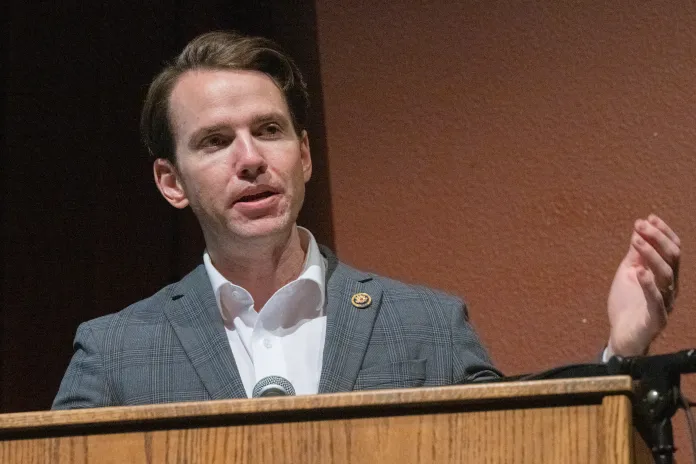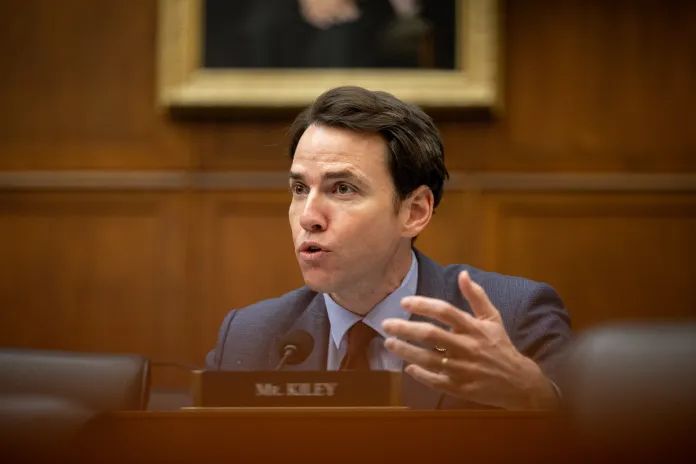SAN DIEGO — Rep. Kevin Kiley (R-CA) thinks Gov. Gavin Newsom’s (D-CA) ambitious plan to redraw the state’s congressional districts ahead of the 2026 midterm elections is a lesson in political greed.
Kiley, a former high school English teacher whose district would be carved up under the new map, described the redistricting battles sweeping across the country as “a direct attack on democracy” and said that they set a dangerous precedent, trampling on the will of the people and increasing the risk of election errors.

“For Democrats, it’s all about getting the result they want, which is to take power away from California voters and concentrate it in their own hands,” he told the Washington Examiner. “In order to do that, they have completely thrown out the window all of the established timelines for an election, the established voter protections that we have, and they’re trying to rush this thing through in an unprecedented way, in a way that is bound to lead to errors.”
Kiley said he has heard of issues in his district involving the double booking of election halls and warned that the situation could worsen. The state, which is battling a $12 billion deficit, has already cleaned up one multimillion-dollar error it made after mailing inaccurate guides about the Nov. 4 special election.
The 2025 Voter Information Guide, which was mailed to 8.5 million voters in late September to provide them with information about Proposition 50, incorrectly labeled District 27 as District 22, according to the secretary of state’s office. Republicans like Kiley pounced on the error, saying it’s a reminder that the push to pass Proposition 50 is moving at warp speed. Kiley tried to slow down the process with legislation he proposed in Congress that would cancel out new maps adopted by states before the 2030 census, including the map drawn in Texas that gives Republicans an advantage.
Kiley told the Washington Examiner he is frustrated that House Speaker Mike Johnson (R-LA) has refused to bring his bill to the floor for a vote. Kiley, a solid conservative and President Donald Trump supporter, has threatened to circumvent leadership and try to force a vote on his bill through a discharge petition. He’s also aired his grievances on social media.
“You can stop Newsom’s Redistricting Sham and save our taxpayers $250 million by bringing my mid-decade redistricting to the Floor,” he wrote on X. It didn’t work.
“It’s very frustrating to me that [Johnson’s] not at least willing to give the House an opportunity to take an up or down vote on this,” Kiley said, adding that the speaker’s refusal speaks volumes.
California’s Proposition 50, a ballot measure backed by Newsom and Democrats, was triggered in response to Trump’s urging of Texas to change its maps to give Republicans a five-seat advantage in next year’s midterm elections. Since then, other red states, such as Missouri, North Carolina, and Utah, have followed suit.
Unlike Texas, where state lawmakers have control over drawing the state’s congressional map, California’s process is more complicated. Its constitution requires that an independent redistricting commission draw the map and that voters approve any changes made to it. That means even though the state legislature passed the proposed map, voters will decide on Nov. 4 whether it will be used for the 2026, 2028, and 2030 elections.
If voters approve it, it would turn three Republican-held seats into safe Democratic seats, making two others more Democratic-leaning. Specifically, the map would change districts held by Kiley and Rep. Doug LaMalfa (R-CA) in Northern California. In Southern California, Reps. Darrell Issa (R-CA) and Ken Calvert (R-CA) would be at risk, and in the Central Valley, Rep. David Valadao (R-CA) would have a much harder time getting reelected if the map is passed.
Kiley represents the state’s 3rd Congressional District, a conservative-leaning area that is also the most geographically diverse in the state. It spans most of the California-Nevada border, including Sierra, Nevada, Placer, Alpine, Mono, Unyo, parts of El Dorado, Yuba, and a few outer Sacramento counties. The district spans Lake Tahoe, Death Valley National Park, and five national forests, making it one of the most rural areas in the state.

The new map would thin out the number of GOP voters, turning it into something that loosely resembles, of all things, an elephant.
The new toss-up district would also combine more liberal coastal communities with the rural, conservative areas that make up the current district. That could make representation tricky for the candidate who wins.
“Everyone in the rural areas, in the foothills, has a lot of the same concerns,” Mark Wright, the Republican Party chair in Placer County, said. “It’s easier for Kevin Kiley to represent us. But if we’re tied to Sacramento County, their biggest issue is crime.”
In the foothills, most people are concerned about fire insurance.
“Sacramento County needs to deal with crime,” Wright said. “In the rural areas, we don’t have much problem with crime… we don’t have the same problems.”
Some of Kiley’s harshest criticism was directed at Newsom. Kiley claimed the Proposition 50 fight is nothing more than a scam crafted to boost the outgoing governor’s national platform. Newsom, who will be termed out of office next year, is one of the front-runners for the Democratic 2028 presidential nomination.
“The governor is calling in every favor that he has from wealthy special interests that have underwritten his political career like [Democratic megadonor] George Soros,” Kiley said. “What’s especially bad is that they can get unlimited amounts of money, and Newsom knew that, and he’s essentially using this as a launching pad for his own presidential campaign. Go to George Soros for a $10 million check, and then run ads featuring Gavin Newsom trying to mislead voters and claim that this thing is the exact opposite of what it is.”
DOUG LAMALFA WARNS PROPOSITION 50 COULD SILENCE CALIFORNIA’S RURAL VOICES
Despite the odds, Kiley, who is in his second term, has remained confident that he can win, touting his record on strong border security, securing federal infrastructure funds, and keeping inflation in check.
Hoping to stop him are two Democratic challengers: Marine veteran Tyler Vandenberg, who is focusing on reversing Trump’s tariffs, and Heidi Hall, a Nevada County supervisor. Vandenberg and Hall both support Proposition 50.

